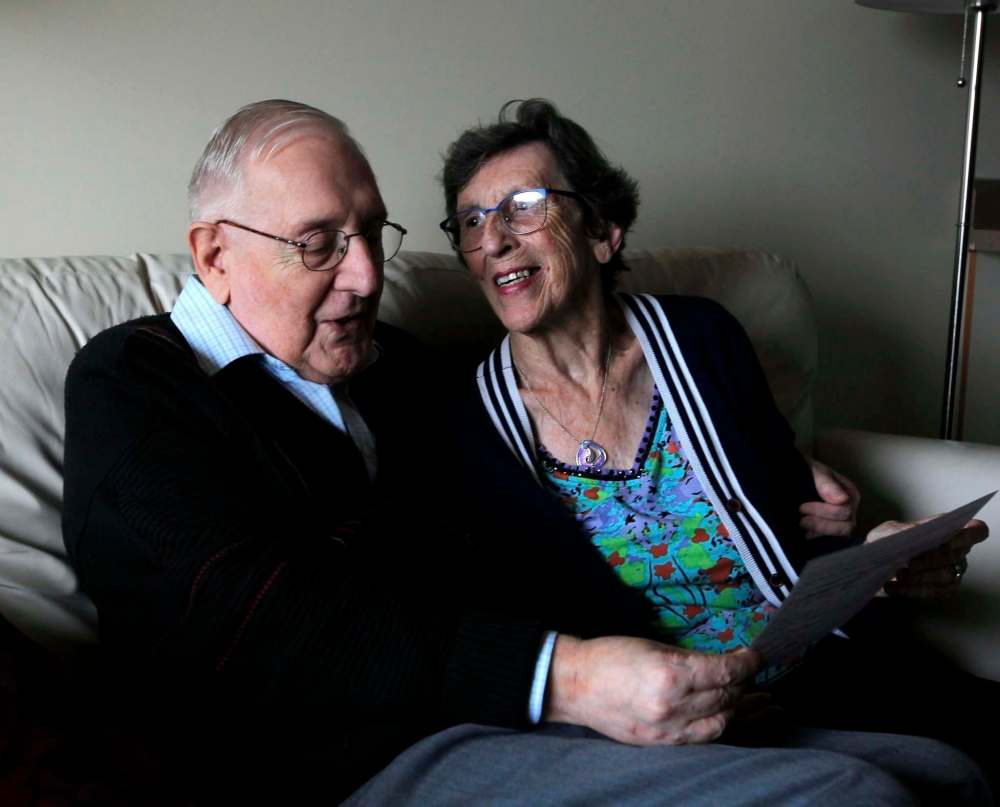In praise of the ‘invisible crutch’
Caregivers commiserate at dementia conference
Advertisement
Read this article for free:
or
Already have an account? Log in here »
To continue reading, please subscribe:
Monthly Digital Subscription
$0 for the first 4 weeks*
- Enjoy unlimited reading on winnipegfreepress.com
- Read the E-Edition, our digital replica newspaper
- Access News Break, our award-winning app
- Play interactive puzzles
*No charge for 4 weeks then price increases to the regular rate of $19.00 plus GST every four weeks. Offer available to new and qualified returning subscribers only. Cancel any time.
Monthly Digital Subscription
$4.75/week*
- Enjoy unlimited reading on winnipegfreepress.com
- Read the E-Edition, our digital replica newspaper
- Access News Break, our award-winning app
- Play interactive puzzles
*Billed as $19 plus GST every four weeks. Cancel any time.
To continue reading, please subscribe:
Add Free Press access to your Brandon Sun subscription for only an additional
$1 for the first 4 weeks*
*Your next subscription payment will increase by $1.00 and you will be charged $16.99 plus GST for four weeks. After four weeks, your payment will increase to $23.99 plus GST every four weeks.
Read unlimited articles for free today:
or
Already have an account? Log in here »
Hey there, time traveller!
This article was published 22/10/2016 (3346 days ago), so information in it may no longer be current.
At 85, Viv Rees is settling into a new role — that of caregiver. His wife, Sheila, was diagnosed with vascular dementia in 2014.
“I tend to cope with days as they come, rather than look down the road at what might happen,” he said.
Looking down the road in Manitoba, the number of people with dementia is expected to increase every year until it peaks in 2038. Then, an expected 41,000 Manitobans will have dementia. Now, nearly half of all Manitobans (43 per cent) know someone who has dementia or Alzheimer’s and the loved ones who care for them.

It’s crucial those caregivers take all the help they can get so they don’t burn out, said Norma Kirkby, program director for the Alzheimer Society of Manitoba. “When they realize what a toll caretaking is having on them, recovery is a lot more difficult.”
The society is hosting its annual conference for caregivers next Saturday.
“We say to them ‘If you don’t look after yourself physically and emotionally, you’re not going to be able to go the journey,” Kirkby said.
It can last an average of eight years, but it can also be 12 years or more, she said. “You have to pace yourself and be knowledgeable about services you can use as the disease progresses,” she said.
“It’s exasperating at times,” said Rees, but never dull.
“She told someone she knew Donald Trump,” said her husband who is certain his wife has never met the Donald.
The changes he’s seen in Sheila have happened slowly, he said. “It’s very insidious.. gradual… More often now, I’m making a decision ‘Is it the old person speaking or the new person speaking?’ The two of them are there.”
Since the dementia diagnosis, they’ve moved into an assisted-living home. “Sheila was forgetting how to cook, and the stove was left on, things like that,” he said.
He said he takes breaks when he can. Friday mornings, he leaves Sheila for 45 minutes to join a singing group in their building. “I can leave her for a short while but not for a long time.”
On Thursdays, he goes for coffee with other caregivers while their spouses attend a support group at the Alzheimer society office downtown. “It’s our own little support group.”
On Monday mornings, a respite worker visits with Sheila for three hours, giving Viv time to himself. In the last four years, he’s taken up writing. His poem Thoughts on Losing Something about being a caregiver has been shared by the Alzheimer society.
In the last year, their daughter who lives in Winnipeg stayed with Sheila so Viv could attend the society’s daylong conference. It was a lot of information in one day, he said.
“The thing I appreciated most was ‘Look at all these people, and we’re all in very much the same position,’” said Rees. “Seeing all these people around me, I thought ‘Good Lord! I’m not on my own.’”
Rees said it reassured him about the future. “I know that there’s an escape route,” he said.
“There are agencies I can depend on that will react when I need it. It’s the invisible crutch.”
carol.sanders@freepress.mb.ca

Carol Sanders
Legislature reporter
Carol Sanders is a reporter at the Free Press legislature bureau. The former general assignment reporter and copy editor joined the paper in 1997. Read more about Carol.
Every piece of reporting Carol produces is reviewed by an editing team before it is posted online or published in print — part of the Free Press‘s tradition, since 1872, of producing reliable independent journalism. Read more about Free Press’s history and mandate, and learn how our newsroom operates.
Our newsroom depends on a growing audience of readers to power our journalism. If you are not a paid reader, please consider becoming a subscriber.
Our newsroom depends on its audience of readers to power our journalism. Thank you for your support.
History
Updated on Saturday, October 22, 2016 8:32 AM CDT: Photo added.

